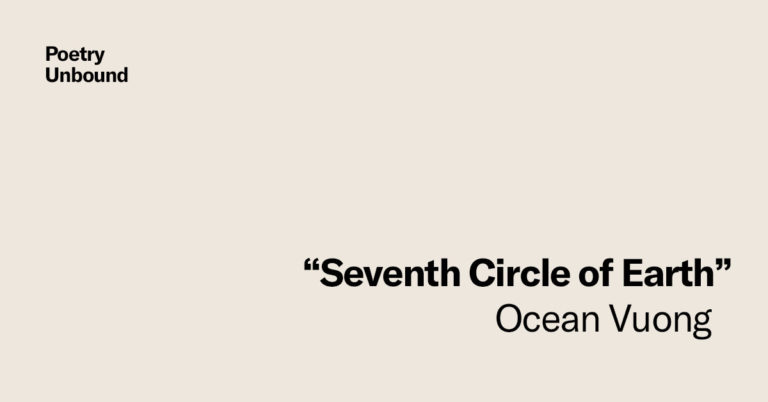Ocean Vuong
Seventh Circle of Earth
Ocean Vuong’s poem “Seventh Circle of Earth” is an homage to the love and intimacy shared by Michael Humphrey and Clayton Capshaw, a gay couple who were murdered in their home in Dallas, Texas. In the midst of recognizing the violence and threat LGBTQI communities face, the poem holds space for tenderness — and honors their love.
A question to reflect on after you listen: What examples have you seen of love and power enacted, even in the face of threat?

© All Rights Reserved.
Guest

Ocean Vuong is a professor in the MFA Program in Creative Writing at New York University. His new collection of poetry is Time Is a Mother. He is also the author of a novel, On Earth We're Briefly Gorgeous, and the poetry collection Night Sky with Exit Wounds, which won the T.S. Eliot Prize and the Whiting Award. He was a 2019 MacArthur Fellow.
Transcript
Pádraig Ó Tuama, host: My name is Pádraig Ó Tuama, and I am from Ireland, and I am a poet. Poetry and pilgrimage are often put together, and I think there’s a deep wisdom behind analyzing these words, especially the word “pilgrimage.” Pilgrimage is never about reaching the place that you’re going on pilgrimage to. The pilgrimage happens when you begin, the desire to go. And poetry, too, is rarely about the control of exactly where we’ll go. Poetry is about what will unfold that’s unexpected in the desire, right here, right now.
[music: “Ashed to Air” by Gautam Srikishan]
This poem by Ocean Vuong has an epigraph from the Dallas Voice. “On April 27th, 2011, a gay couple, Michael Humphrey and Clayton Capshaw, was murdered by immolation in their home in Dallas, Texas.” The poem is called “Seventh Circle of Earth.”
- As if my finger, / tracing your collarbone / behind closed doors, / was enough / to erase myself. To forget / we built this house knowing / it won’t last. How / does anyone stop / regret / without cutting / off his hands? Another torch
- streams through / the kitchen window, / another errant dove. / It’s funny. I always knew / I’d be warmest beside / my man. / But don’t laugh. Understand me / when I say I burn best / when crowned / with your scent: that earth-sweat / & Old Spice I seek out each night / the days
- refuse me. / Our faces blackening / in the photographs along the wall. / Don’t laugh. Just tell me the story / again, / of the sparrows who flew from falling Rome, / their blazed wings. How ruin nested inside each thimbled throat / & made it sing
- until the notes threaded to this / smoke rising / from your nostrils. Speak– / until your voice is nothing / but the crackle / of charred
- bones. But don’t laugh / when these walls collapse / & only sparks / not sparrows / fly out. / When they come / to sift through these cinders–& pluck my tongue, / this fisted rose, / charcoaled & choked / from your gone
- mouth. / Each black petal / blasted / with what’s left / of our laughter. / Laughter ashed / to air / to honey to baby / darling, / look. Look how happy we are / to be no one / & still
- American.
The poem is presented in a really interesting way. First, the title, “Seventh Circle of Earth,” is a playing on Dante’s Inferno, the seventh circle of hell. And in Dante’s imagination, the seventh circle of hell is the place where the homosexuals are punished. And then the epigraph, describing what’s happened to this couple in Dallas, Texas, by being murdered by immolation — so those set the scene for violence in light of great drama and tragedy.
And then the poem doesn’t occur on the page. The poem is footnoted. So there’s a page with no writing, just with footnotes, numbers. And you see that this poem is happening in a subterranean level. And it’s kind of like saying that the individuals themselves also expected to live in a subterranean level. They didn’t expect to live out in the light; that the individuals being described in here possibly also saw themselves as being worthy of being murdered by immolation. There’s this sense of — one wonders about self-hatred. The tenderness of their relationship is extraordinary. There’s a line, it says, “To forget / we built this house knowing / it won’t last.” And that, to my mind, locates the poem in people who know, we live in a world where a same-sex couple are expecting violence and expecting that this is almost inevitable. And in that context, the title of the poem, “Seventh Circle of Earth,” is a deeply confronting title. It’s saying, what world have we made that people in certain circumstances look at themselves, and look at themselves in the context of the powers around them, and say, “Yeah, we’re going to be subject to hostility”?
A few years ago at Easter, Paul and I were gonna go away for a holiday, just for a few nights. And I was phoning around, places to hire in the west of Ireland, a hotel or a guesthouse, and with each one of them was saying, “We’re a gay couple, just so you know that. Is that gonna be a problem for you?” With one place it was, and with another place they said, “Well, we can’t interfere in your private life.” And I felt so corrupt, paying money for that place, because I thought, “I don’t want to give you my custom.” But it was the only place I could afford. And I found myself thinking, I live in a world where I know that I’ll be anxious in going to a place, unless I’ve double-checked that they’re not going to refuse us because we’re a male couple. And while, on the one hand, I’ve learned the tools of surviving that, I’d be delighted to not have to know that these are the kinds of questions you ask.
And I look at the circumstances of my life where I have to ask those questions sometimes, and then I know that there are other people who have to ask those questions all the time, where they are faced constantly, from turning up in class, from turning up at work, from how it is that people might read any parts of their identity, where they will be considered a surprise to be there.
The phenomenal craft of this poem is that in the face of violence, murder by immolation, Ocean Vuong has written a poem that’s almost erotic: “Each black petal / blasted / with what’s left / of our laughter. / Laughter ashed / to air … ”
And then you think of “laughter ashed,” and it’s almost like there’s something sublime being described in being consumed with love. And people do sometimes used that word, “Oh, we were consumed with love for each other.” And Ocean Vuong is saying, let’s do something else with that word, “consumed.” People say, “Oh, our love burns deep.” Let’s talk about what burning looks like in love. And then the gloriously erotic comes in, “to honey to baby / darling, / look. Look how happy we are / to be no one / & still // American.”
Somebody came up to me once, after I’d been leading a gathering for — speaking about LGBT inclusion, and particularly, bringing people together who were cautious or anxious about this. It felt new to them. And somebody came up to me afterwards and said, “I just need to give you a compliment, because you don’t seem like a homosexual at all.” And I was like, “Oh, right. That’s not a compliment, really. I’m very happy to be a gay man.” And there was something where the person who said that to me was shocked when I said, “I’m happy. This isn’t a burden to bear.” I mean, your anxiety about me is a burden to bear. But being gay is not a burden to bear. I’m very pleased. I wouldn’t want a different life. And there is that privacy, that holding of that small, intimate space at the heart of this poem, in the midst of recognizing that that small, intimate space is a place of immolation.
“Seventh Circle of Earth” by Ocean Vuong with the epigraph, “‘On April 27th, 2011, a gay couple, Michael Humphrey and Clayton Capshaw, was murdered by immolation in their home in Dallas, Texas’ from the Dallas Voice.”
- As if my finger, / tracing your collarbone / behind closed doors, / was enough / to erase myself. To forget / we built this house knowing / it won’t last. How / does anyone stop / regret / without cutting / off his hands? Another torch
- streams through / the kitchen window, / another errant dove. / It’s funny. I always knew / I’d be warmest beside / my man. / But don’t laugh. Understand me / when I say I burn best / when crowned / with your scent: that earth-sweat / & Old Spice I seek out each night / the days
- refuse me. / Our faces blackening / in the photographs along the wall. / Don’t laugh. Just tell me the story / again, / of the sparrows who flew from falling Rome, / their blazed wings. How ruin nested inside each thimbled throat / & made it sing
- until the notes threaded to this / smoke rising / from your nostrils. Speak– / until your voice is nothing / but the crackle / of charred
- bones. But don’t laugh / when these walls collapse / & only sparks / not sparrows / fly out. / When they come / to sift through these cinders–& pluck my tongue, / this fisted rose, / charcoaled & choked / from your gone
- mouth. / Each black petal / blasted / with what’s left / of our laughter. / Laughter ashed / to air / to honey to baby / darling, / look. Look how happy we are / to be no one / & still
- American.
Lily Percy: “Seventh Circle of Earth” comes from Ocean Vuong’s book Night Sky with Exit Wounds. Thank you to Copper Canyon Press, who published the book, and to Ocean for letting us use his poem. Read it on our website at onbeing.org.
Poetry Unbound is Tony Liu, Chris Heagle, Kristin Lin, Erin Colasacco, Serri Graslie, Eddie Gonzalez, and me, Lily Percy. Our music is composed and provided by Gautam Srikishan. This podcast is produced by On Being Studios, which is located on Dakota land. We also produce other podcasts you might enjoy, like On Being with Krista Tippett, Becoming Wise, and This Movie Changed Me — find those wherever you like to listen or visit us at onbeing.org to find out more.
Books & Music
Recommended Reading
The On Being Project is an affiliate partner of Bookshop.org and Amazon.com. Any earnings we receive through these affiliate partnerships go into directly supporting The On Being Project.





